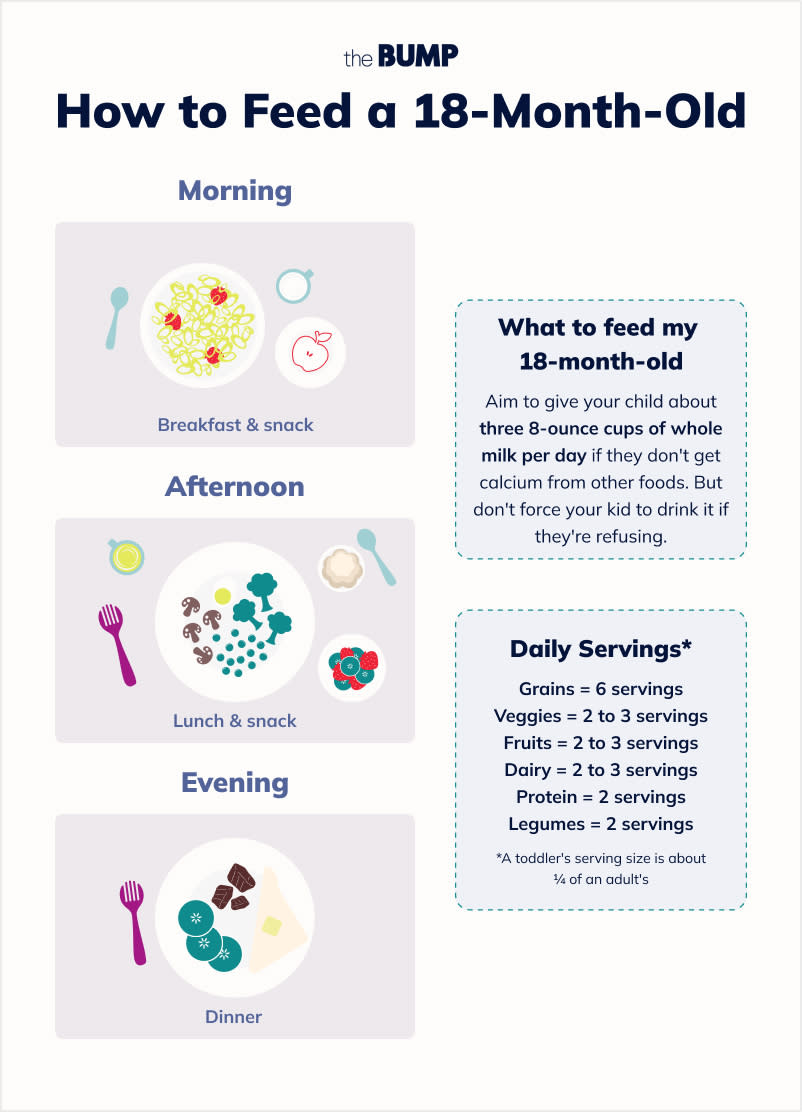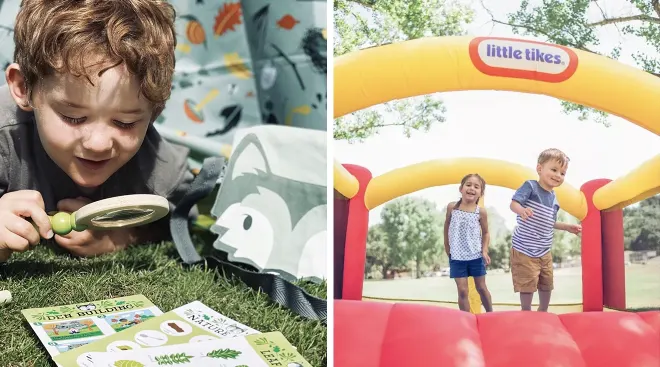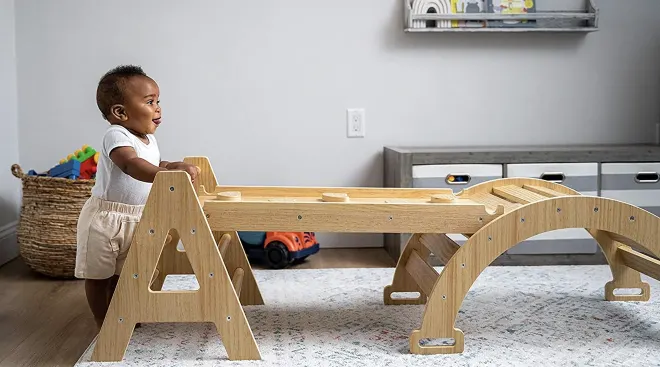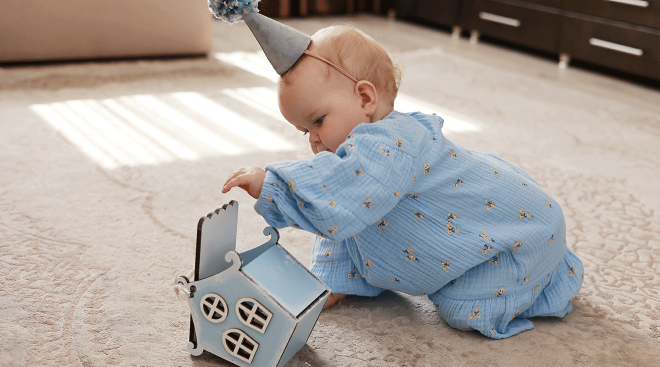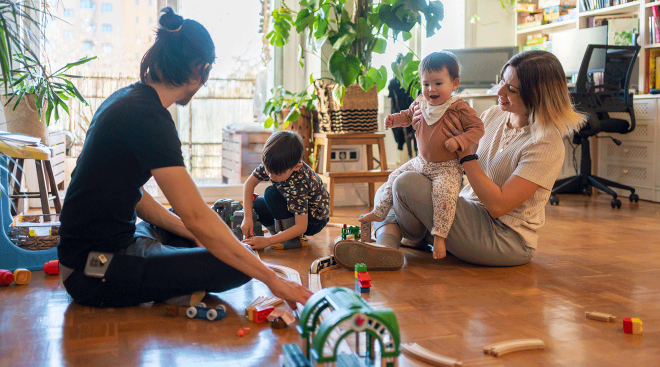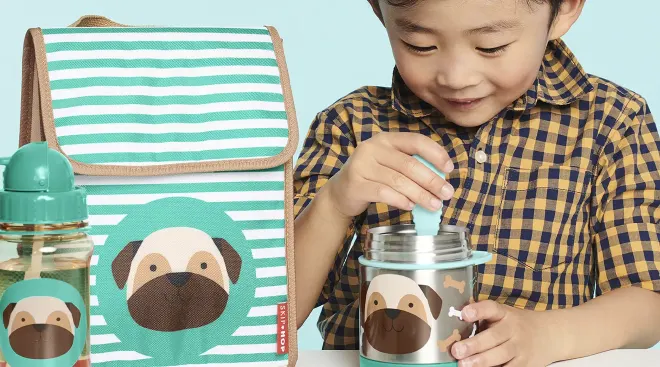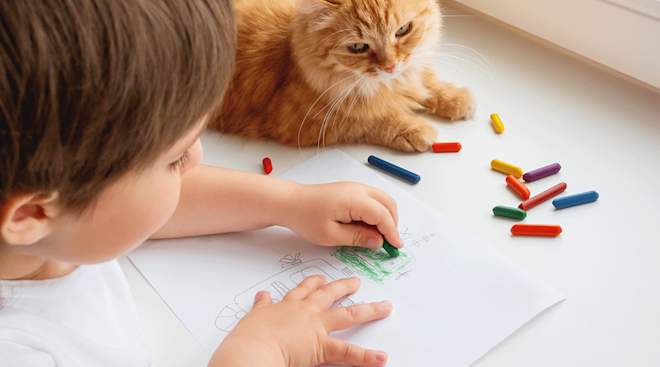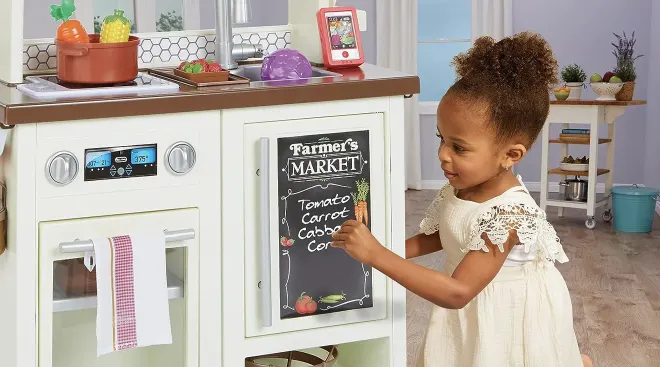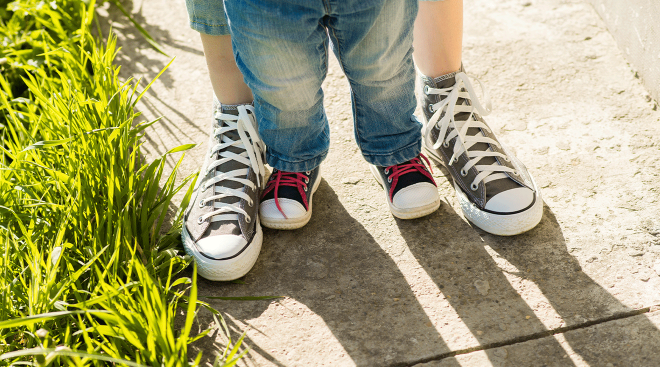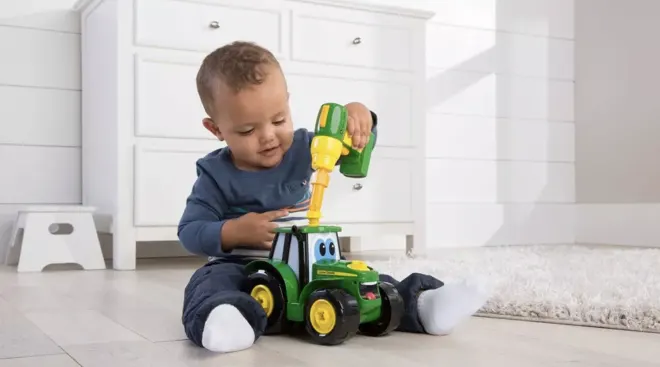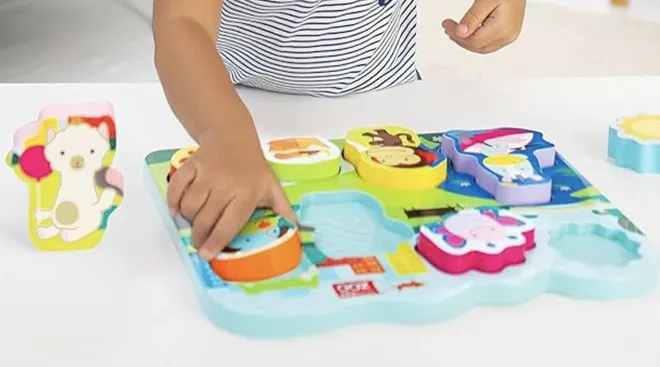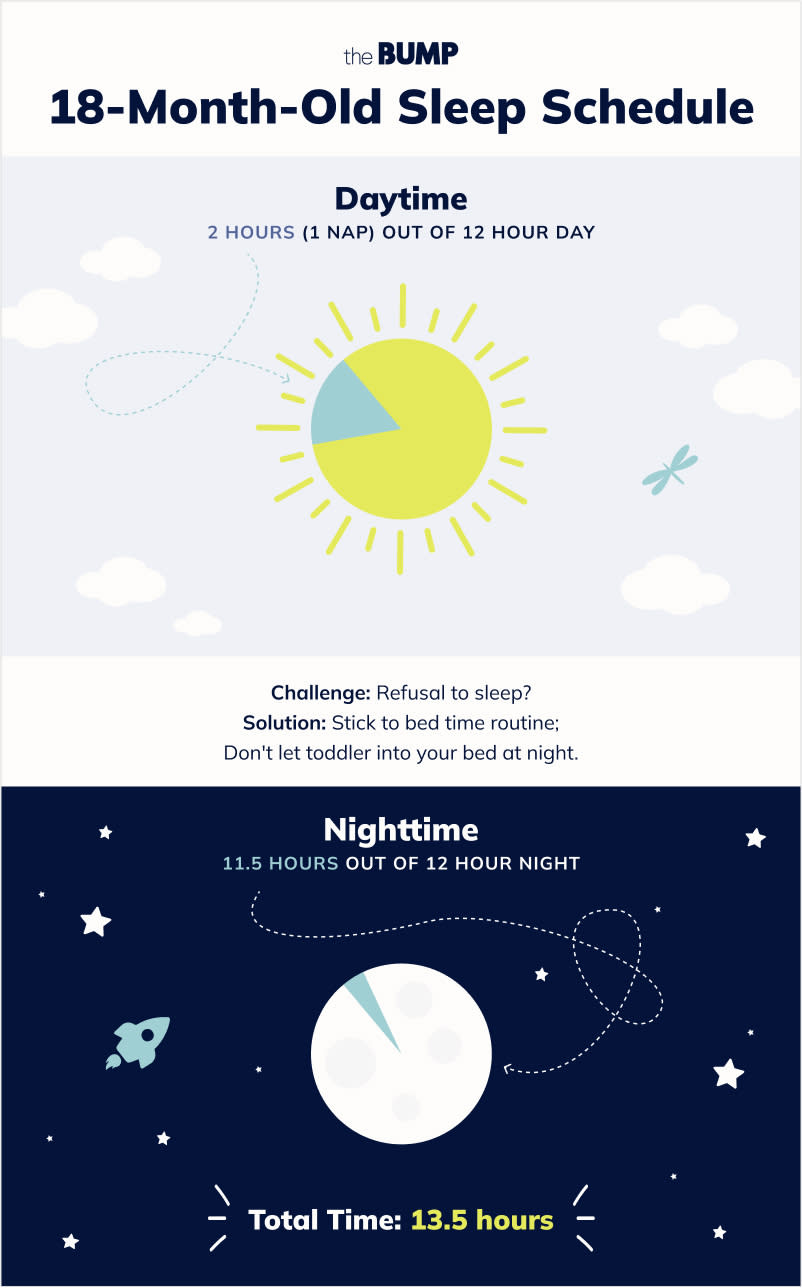18-Month-Old
Your toddler is 18 months old! Kids this age are total attention hogs, so don’t be shocked if your toddler turns up the volume every time you begin an adult conversation. They’re also into exercising their independence—though it may not seem like it when they're clinging to your leg at daycare drop-off. Your little independent kiddo is more likely to express themself through words like “mine!” and “now!” and by refusing to be strapped down in any manner. (Hello car seat battles!) Let your toddler buckle in a stuffed animal friend before climbing in the car seat—it might make them feel better about buckling up too.
With this newfound independence, you may face some fresh challenges and adventures with your 18-month-old baby. Don’t fret—we’re here to help you navigate these exciting (and yes, sometimes trying) times. Read on to discover which 18-month-old milestones you should be looking out for as your tot continues to grow and develop.
Your growing 18-month-old is probably full of energy and using it to work on a ton of physical skills.
18-month-old weight and height
How much should an 18-month-old weigh and measure? According to the World Health Organization, average weight of an 18-month-old is 23.4 pounds for girls and 24.1 pounds for boys. Average height of an 18-month-old is 31.8 inches for girls and 32.4 inches for boys.
18-month-old milestones
Parents tend to wonder, “What should my 18-month-old be doing?” Here are some 18-month-old milestones your child may have hit or may be working on:
- Walking. Most 18-month-olds aren't just walking—they're running. Soon they may begin to jump. But they'll still probably ask to be carried when you're in crowds or taking a longer jaunt.
- Speech. Most 18-month-olds can say five or more words. Soon, your child might start saying two-word phrases. Pointing to an item they want will soon turn into asking for the thing by name. (This goes for naming people as well!)
- Teething. A toddler's upper cuspids tend to break through between 16 to 22 months, so brace yourself for another round of teething.
- Potty training. A few toddlers at this age might show signs of readiness to start potty training. If your child tells you they have to go, they want their dirty or wet diaper changed, they're interested in the potty, they can pull their pants up and down and/or they stay dry for at least two hours in a row, they may be ready to try potty training. But don't rush it; it's much more common for kids to be ready to ditch the diapers between ages 2 and 3. It simply won't work if you start before your child is mature enough.
18-month-old behavior
Your independence-seeking 18-month-old may be exhibiting some challenging and pretty odd behaviors. Tap below for advice on dealing with:
- Tantrums. Even though your kid's language is developing by leaps and bounds, they still can't communicate everything they want to say, and that can lead to some meltdowns. Keep stressful situations, such as a trip to the supermarket, short—and make sure they're well-rested and fed beforehand.
- Separation anxiety. We’ve all done it: the sneak-away-without-saying-goodbye-once-the-sitter-arrives tactic. But in order to avoid having your child think you could disappear at any time, always acknowledge your departure and emphasize that you’ll be coming back. Other effective strategies? Set them up with an activity as you’re leaving—and keep goodbyes lighthearted but short and firm.
- ADHD. So your 18-month-old is impulsive, hyperactive and has trouble paying attention? Parents might begin to wonder if their child could be showing signs of ADHD (attention deficit hyperactivity disorder), but the fact is, it's too early to tell. Most kids this age exhibit these behaviors—it’s only if they don't grow out of them that it may indicate something more serious, like ADHD. Of course, bring up any concerns with your doctor, but know that a true ADHD evaluation likely won’t happen until your child is in a formal school setting.
- Autism. At the 18-month checkup, your child's pediatrician will likely ask you a series of questions about your child's behavior to look for signs of autism. Signs may include unusual movements (such as flapping arms), not making eye contact and interacting atypically with others.
How to discipline an 18-month-old
Want to get your child to behave? Remember that toddlers are still developing their cognitive and social-emotional abilities, and they still lack sufficient verbal skills to express themselves clearly (can you imagine how frustrating that must feel?). Positive behavior should be rewarded; negative behavior shouldn't. Acknowledge their feelings but set limits and stick to them. Make sure they get plenty of food, rest, exercise and one-on-one attention. Most of all, be patient and find ways to teach them what’s appropriate behavior.
Eighteen-month-olds seem to have mild illness after mild illness. Some common health questions parents have at this age include:
- My 18-month-old has diarrhea. What should I do?
- My 18-month-old is constipated. What should I do?
- My 18-month-old has a fever. What should I do?
- What should I do about my 18-month-old's cough?
- My 18-month-old baby is throwing up. What should I do?
- What should I do about croup in an 18-month-old?
When it comes to eating and drinking, this age is all about transitioning: Your child probably isn't eating much "baby food" anymore, and drinks whole milk instead of breast milk or formula. Most 18-month-olds can drink from a regular cup, and about half can drink from a straw cup. They shouldn’t be using bottles at this age though. (Bottles should typically go by the time your kiddo is 12 months.)
How much should my 18-month-old eat and drink?
One- to 2-year-olds should be eating much like you do: three meals per day, plus two snacks.
Aim to give your child about three 8-ounce cups of whole milk per day if they don't get calcium from other foods. But don't force your kid to drink it if they're refusing.
If you're weaning an 18-month-old from breastfeeding, remember to go slow. Drop one daily nursing session for at least three to seven days before dropping the next. If you go too fast, you could risk plugged milk ducts and infection. Plus, it's a transition that could have an emotional effect on your child, so they may need a little extra comfort while weaning.
What should my 18-month-old be eating?
Continue to offer your child a variety of foods at each meal and during snack time. Most toddlers should eat about ¾ to 1 cup of fruits and veggies, 1.5 cups of grains and 4 tablespoons of protein per day.
Looking for some tasty and nutritious meal inspiration? Check out these food ideas for an 18-month-old:
18-month-old feeding schedule
*A toddler's serving size is about ¼ of an adult's
Source: HealthyChildren.org
18-month-old won’t eat
Toddlerhood is known for picky eating, so try not to worry too much if your child is turning down nutritious foods and eating what seems like half a bite for dinner. They're not growing as quickly as they did in their first year, and let's face it, saying “no” to eating is part of exercising their newfound independence. The best you can do is to keep offering nutritious food options, choosing and preparing food together, and modeling healthy eating behaviors for your child. You can bring up any worries about growth or weight gain with the pediatrician at the 18-month checkup.
Should an 18-month-old take vitamins?
If you're concerned your tot isn't getting enough nutrition in their diet, ask the pediatrician about supplementing with vitamins. Some toddlers take a multivitamin, iron or vitamin D supplement. Fiber supplements are commonly given to prevent constipation, but they're rarely needed: fruits and veggies can usually do the trick to keep an 18-month-old's digestive system on track.
Getting a good night's sleep is important for your toddler's growth and brain development.
How much sleep does an 18-month-old need?
Most 18-month-olds need around 11 to 12 hours of nighttime sleep, plus a nap of about 1.5 to 3 hours, for a total of about 13 to 14 hours of sleep per day.
18-month-old sleep schedule
Every kid is different, but your child's schedule may look something like this:
18-month-old sleep training
At 18 months, doctors recommend that kids fall asleep in their bed on their own, without special comfort measures, like rocking from Mom or Dad or a special song playing on the tablet. That's because if your child wakes in the middle of the night, they'll need to know how to put themself back to sleep without the extra help.
Not quite there yet? It's not too late to sleep train at 18 months—especially if your child is still sleeping in a crib. But know that they might be extra-sensitive to it now that they’ve gained some independence and have a better understanding of time away from you than they did as a young baby. Go slowly, setting up a routine where your toddler consistently goes to bed while sleepy but still awake. If they’re used to being with you at bedtime, gradually create some distance each night until you completely remove yourself from their room.
18-month-old sleep regression
Regression can happen when a formerly good sleeper suddenly begins waking more, throwing parents for a loop. A bout of teething or illness could be the cause, or maybe a trip or holiday where their sleep routine changed. To get back to the usual snoozing routine, it's important to know the root of the problem, so you can find the right solution to help your child get through it. Stick with the usual bedtime routine and set limits that will help your child get back on track.
18-month-old won’t sleep
Some nights it seems like you just can't get the kid to sleep. But the truth is, kids need sleep and they will eventually sleep if given the proper cues. Wind things down before bedtime—turn off the TV, music and devices; give them a soothing bath; read calming bedtime stories. And keep the routine consistent: one book, two kisses, one refill of water, then lights out, for example. Don't let your kid stall or delay.
18-month-old climbing out of crib
Climbing is fun! Can you blame your 18-month-old for wanting to climb out of the crib? Some savvy parents catch their toddlers pulling a jailbreak and effectively put an end to it; others simply can't stop them. Once it becomes clear that your child isn't staying put, it's more likely they'll get hurt falling while climbing than they would if they rolled off a low bed. Then it’s time to convert the crib, or bring in a toddler bed or big-kid bed with rails. Some parents choose to put the crib mattress on the floor to prevent falls.
18-month-old night terrors
A night terror is defined as a crying or screaming episode where the child never really wakes and so is unresponsive. Don't try to wake your child during a night terror; just do your best to calm them back to sleep. And be sure their sleeping space is safe to avoid injury if they flail or walk around.
The good news is these seemingly wild sleep disruptions are only upsetting for you. Kids don't even remember them! And most kids grow out of having them around age 13. There's no known cause of night terrors, but stress, changes in routine and overtiredness can contribute to them. So try to stick to a calming bedtime routine, and put your child to bed early, so they can get a full night's rest.
Eighteen-month-olds are very fun to play with. Singing, reading books and having a dance party together helps your child learn and is great quality bonding time for you both. Looking for things to do with an 18-month-old? Some fun activities, games and toys for an 18-month-old include:
- Singing “Itsy Bitsy Spider.” 18-month-olds tend to love finger play with fun songs and rhymes.
- Reading board books. Your increasingly independent child will probably start to look at and page through books on their own.
- Playing music. Time for a toddler dance party! Eventually, your little one may start to sing along.
- Playing catch. Your child may soon be able to learn to throw a ball overhand.
- Blowing bubbles. Head outside for a little fresh air and bubbles—they're a no-fail way to make a toddler smile.
- Playing hide-and-seek with a toy. Your child is now able to clearly remember an object, even though they can't see it—otherwise known as object permanence.
- Enjoying pretend play. Now is a great age to encourage your 18-month baby to use their imagination and engage in make-believe, which is an important part of child development. Have them cook you breakfast in their play kitchen or dress up in costumes and become superheroes together.
- Take your toddler to their 18-month checkup.
- Schedule your toddler's 2-year (24-month) checkup.
- Your child may need a final dose of the Hep A, DTaP or Hib vaccinations, if they didn't already receive them.
- Keep up the tooth brushing. Your tot might start to want to do this on their own. Encourage the independence but make sure you're helping, so you can be certain teeth are thoroughly cleaned.
- Have cleanup time together. Your child will begin to learn where items belong and can soon put toys away themselves.
- If your tot is at daycare, look into the requirements for moving them from the infant room to the toddler room. Gradually introducing an 18-month-old to other toddlers their age is a prime way to promote their socialization skills.
- Toddlers at this age can usually identify multiple body parts. Continue practicing the names of body parts to help boost their understanding and vocabulary—it’s a perfect opportunity to make up some silly games!
Your toddler is a year and a half now and they’re growing and learning by leaps and bounds every day. As they continue to develop, they’ll learn new words and start understanding more complex sentences. You have so much to look forward to in the upcoming months!
Please note: The Bump and the materials and information it contains are not intended to, and do not constitute, medical or other health advice or diagnosis and should not be used as such. You should always consult with a qualified physician or health professional about your specific circumstances.
Navigate forward to interact with the calendar and select a date. Press the question mark key to get the keyboard shortcuts for changing dates.


































